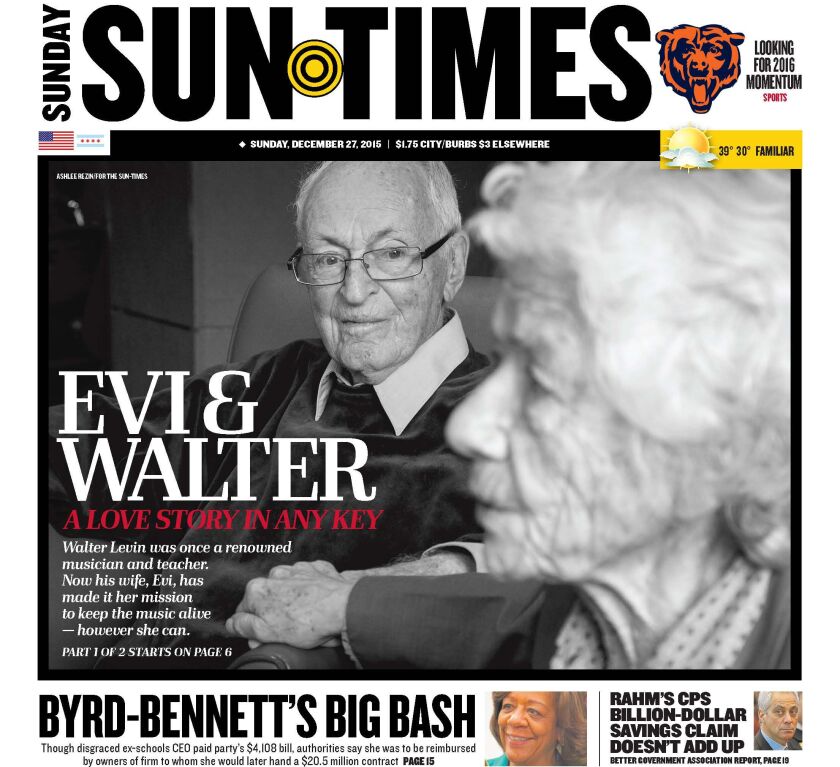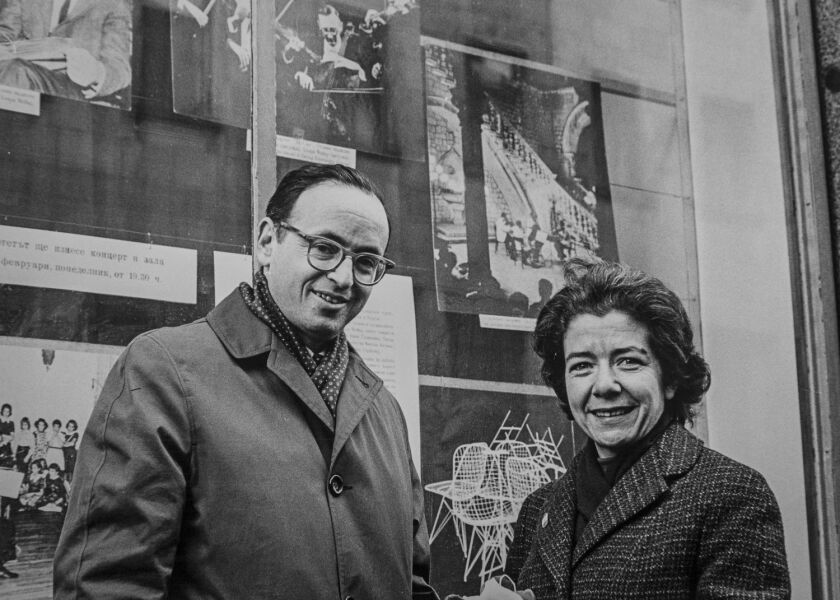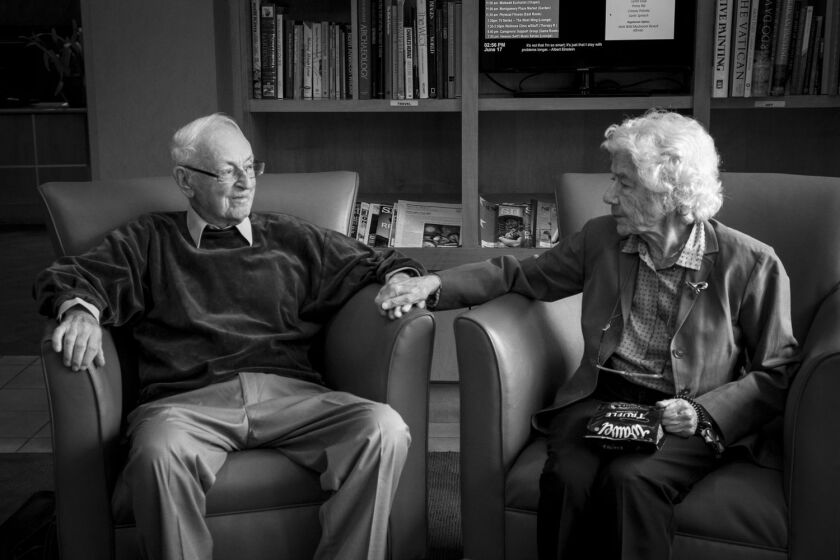Evi Levin, whose fierce and loving support of her husband Walter Levin ensured that the renowned violinist was surrounded by music even as he declined from dementia, died of congestive heart failure Aug. 11 at Montgomery Place in Hyde Park. She was 96.
Before her husband died in 2017, she would lay out his breakfast cereal and mittens. She turned the pages of his sheet music so he could continue giving lessons and escorted him to the Chicago Symphony Orchestra. Her spirited, inventive caregiving was chronicled in “Evi & Walter: A love story in any key,” a Chicago Sun-Times series published in December 2015.
Mrs. Levin was far more than handmaiden to her husband. A piano prodigy and classically trained singer, she went from aristocratic circles in Europe to wartime refugee. To help support her immigrant family, she played piano at a soda fountain in New York.
After marrying Walter — a refugee from Berlin who became a globetrotting musician with the famed LaSalle Quartet — she served as his agent and unofficial record-keeper for the group, which recorded for the Deutsche Grammophon label.
Through all of her transformations, she retained a bubbly, buoyant determination, according to her son David.
Mrs. Levin also had a profound impact on many of her husband’s students. He was a thorny, exacting teacher they approached with respect and a little fear. But they found his wife irreverent, approachable and encouraging.
Multilingual, gregarious and culturally omnivorous, she talked with them about Italian opera, German lieder and the French composer Debussy.
Though the Levins didn’t own a TV, they occasionally let their two sons watch “Hogan’s Heroes” at a neighbor’s home because Werner Klemperer, aka “Col. Klink,” was the son of German conductor Otto Klemperer.
READ ‘EVI & WALTER: A LOVE STORY IN ANY KEY’
The family spoke German at home. For fun, the Levins might play a rigorous version of name-that-tune. They’d turn on the radio and listen to a classical music station.
“Naming the piece took about three or four seconds,” their son Tom told the Sun-Times. “The real game that my parents played was not ‘name that piece,’ but ‘who is playing.’ ”
They particularly loved listening to the work of conductor Arturo Toscanini.
Mrs. Levin grew up Evi Mayer in a well-to-do Jewish family in Sofia, Bulgaria. When the Mayers rode their horses on the land around King Boris’ palace, they’d see him nearby.
They fled amid rising anti-Semitism, traveling to Italy and Spain. In Barcelona, she recalled a man in military garb boarding their boat and shouting fascist slogans.
“He goes over to my father, whispers in his ear, ‘I’m a Hungarian Jew. Come with me,’ ” she told the Sun-Times.
He led the family to temporary safety. Later, the Mayers came to New York, where she married a fellow Bulgarian. He left her, though, souring her on romance.
When she met Walter through friends, he was still seething about the loss of another violinist in the quartet.
“Oh, I loved that intensity,” she recalled in the 2015 stories.
In 1949, when the quartet was in residence at Colorado College, she found out “faculty girlfriends” had to pay tuition. Faculty wives didn’t.
“They got married so she could take classes for free,” said David Levin. “She was utterly devoted to him and really a free spirit.”
Before settling in Chicago, they divided their time between Cincinnati, where the quartet was in residence at a conservatory, and Switzerland, where the quartet spent summers.
Once, Mrs. Levin encouraged David to listen closely during equestrian lessons at summer camp in Switzerland. “You never know when you’re going to have to flee a country on horseback, so pay attention,” she said.
“I was, like, ‘Wait, what?’ I thought I was just going to summer camp,” David Levin said.
Mrs. Levin loved the family German shepherd Anka — Bulgarian for “little Ann.” And she enjoyed new operas and theater — the more experimental the better.
When Walter was home, the Levins ate dinner at the same time every day. The children kept quiet as their father napped between performances. But while he was on tour, Mrs. Levin invited over lots of friends, neighbors and artists.
“When he went out of town, it turned into party central,” David Levin said.
At Montgomery Place, Mrs. Levin helped organize movie nights and immersion dinners where people conversed in German, French or Russian, according to David Levin. And she helped edit the “Montgomery Messenger” newsletter.
Funeral arrangements are pending. In addition to her sons, Mrs. Levin is survived by four grandchildren.








